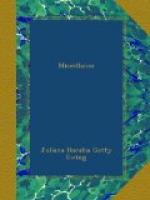“On this particular occasion I was on the river Peiho, in one of the clumsy Chinese river-boats. If the wind were favourable, we sailed; if we went with the stream—well and good. If neither stream nor wind were in our favour, the boat was towed.”
“Like a barge—with a horse—Cousin Peregrine?”
“Like a barge, Maggie, but not with a horse. One or two of the Chinamen put the rope round them and pulled us along. It was not a quick way of travelling, as you may believe, and when the Peiho was slow and winding, I got out and walked by the paths among the fields.”
“Paths and fields—like ours?”
“Yes. Very like some bits of the agricultural parts of England. But no pretty meadows. Every scrap of land seemed to be cultivated for crops. You know the population of China is enormous, and the Chinese are very economical in using their land to produce food, and as they are not great meat-eaters—as we are—their fields are mostly ploughed and sown, so I walked along among rice-fields and cotton-fields, and with little villages here and there, where the cottages are built of mud or stone with tile roofs.”
“Did you see any of the villagers?”
“Most certainly I did. You must know that the inhospitable way in which the Chinese and Japanese have for many long years received strangers has come from misunderstandings, and ignorance, and suspicion, and perhaps from some other reasons; but the Chinese and Japanese villagers who see strangers for the first time, and have lived quiet country lives out of the way of politics, are often very hospitable and friendly. I am bound, however, to except the women; not because they wished us ill, but they are afraid of strangers, and they kept well out of our way.”
“Do the village Chinese women have those funny smashed-up feet, Cousin Peregrine?”
“In the north of China they have. In the south only ladies deform themselves in this fashion; and the Tartar women always leave their own beautiful little feet uninjured. Well, the men came out of their cottages and fields, and pressed eagerly but good-naturedly round me.”
“Do the village men wear pigtails?”
“Every Chinaman wears a pigtail. A Chinaman without a pigtail would be as great a rarity as a Manx cat, or rather, I ought to say, he would be like the tailless fox in the fable; only you would never catch a Chinaman trying to persuade his friends that it was creditable to have no tail! For I must tell you that pigtails are sometimes cut off—as a degradation—when a man has committed some crime. But as soon as he can, he gets the barber to put him on a false pigtail, as a closely-cropped convict might wear a wig. They roll them up when they are at work if they are in the way, but if a servant came into your room with his tail tucked up you would be very angry with him, It would be like a housemaid coming in with her sleeves and skirt tucked up for house-cleaning—most disrespectful!”




